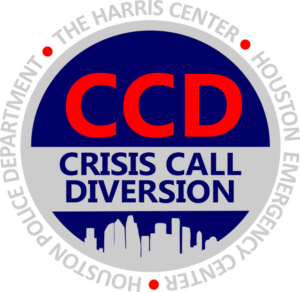We're currently performing maintenance to enhance your experience. The site is still accessible, but some features may not be at their best. Thank you for your understanding!

Crisis Call Diversion Program (CCD)
The first of its kind in the nation, the Crisis Call Diversion (CCD) program is a collaboration between the Houston Police Department (HPD), Houston Fire Department (HFD), Houston Emergency Center (HEC) and the Harris Center for Mental Health & IDD, with the express purpose of decreasing the volume of non-emergency Mental Health-related calls for service for both HPD patrol and HFD emergency medical services (EMS) and reducing the use of these personnel for non-emergency responses. As described in the following paragraphs, the program has not only proven to save first responder resources, it provides a significant improvement in mental health services to the citizens of Houston.
Background
Nationally, law enforcement response to persons in serious mental health crises continues to increase. This trend under the umbrella of the Houston Police Department (HPD) and the citizens it serves is no different. In 2007, HPD officers responded to 15,122 calls for service (CFS) involving a mental health nexus. Each year this number steadily increased and in 2017, HPD officers responded to 37,032 calls for service coded as mental health-related (CIT). As funding continues to diminish for community mental health services, citizens in serious mental health crises are relying more and more on emergency services such as the HPD, the Houston Fire Department (HFD) and the 911 Emergency System for help. These types of calls for service are time-consuming, complex, and draining on first responder resources.
In 2015, after several years of research, the Houston Police Department’s Mental Health Division developed the Crisis Call Diversion (CCD) program. The CCD program is a multi-agency collaboration between HPD, HFD, the Houston Emergency Center (HEC) and the Harris Center for Mental Health and IDD. It is designed to identify and redirect non-emergent, non-life-threatening CFS that are mental health crisis related (CIT) away from first responder resources (police and EMS) and toward Harris Center for Mental Health & IDD mental health professional tele-counselors located at the 911 call center.
Program Impact for First Responders and Houston Community
As mentioned above, in 2017, HPD responded to 37,032 calls for service coded as CIT. Out of those 37,032 CFS, 41% resulted in an “information” only disposition. Research has indicated that a substantial number of these crisis calls may have been handled more effectively by quickly connecting callers who have non-emergent mental health-related issues directly to mental health professionals rather than automatically dispatching police officers and/or EMS personnel.
Traditionally, HFD “Psych Problem” CFS required automatic, high-priority (Code 2), dual-response from both HFD and HPD. For the previous five years, 75% – 82% of the psychiatric calls that HFD responded to, along with HPD patrol units, were non-transports. Current protocols by CCD conducting a secondary in-depth assessment of these non-emergent Psych/CIT calls has yielded a significant reduction in dual, high-priority responses by both HFD and HPD. In these cases, the tele-counselors are providing the appropriate resources to the caller for referral and in most cases are successfully diverting these calls away from the police and EMS. This noticeable impact was immediately observed shortly after the Houston Fire Department joined the collaboration in June of 2017, starting with 1st party HFD CIT calls and an even greater impact was realized after December 15, 2017, following full deferral of most non-emergent 3rd party HFD CIT calls.
CCD Counselors have helped first responders and the Houston community in such a way that in 2017, CCD counselors handled 7264 Calls-For-Service (CFS). The breakdown below demonstrates the effectiveness of the CCD program;
• Total HPD CIT calls handled by CCD tele-counselors – 7264.
• CIT calls-for-service (CFS) diverted from patrol – 2151.
• Clinical Mental Health Assessments completed – 2300
o Assessments with completed Suicide Safety Plans – 252
o Assessments with completed Violence Safety Plan – 676
• Referrals accepted by consumers to Harris Center services (MCOT, PATH, etc.) and other community services – 1838
• Referrals offered but follow-up declined – 1040
• Total HFD CIT calls handled by CCD tele-counselors – 344 (Starting June 2017)
• CIT CFS diverted from HFD (but still responded to by HPD) – 184 (These are typical co-responding HFD/HPD calls, i.e.: Psych Disturbance/CIT)
Since the initiation of the CCD Pilot program in the spring of 2015, under the guidance of the Mental Health Division, the Crisis Call Diversion program has made great progress diverting non-emergent CIT calls away from police and EMS to CCD counselors whereby they link the caller to needed services rather than dispatching a police unit or HFD personnel. This translates into modest cost savings and more importantly significant cost avoidance to first responder agencies. Initial research has revealed the following cost avoidance statistics. The CCD program budget is approximately $460,000 annually.
From the cost savings perspective of the Houston Police Department, a baseline goal of 200 diverted CIT calls monthly, places the cost avoidance equation at $36,600. The calculation formula used is as follows:
• 104 minutes = average time spent on a CIT call by patrol.
• $57.43 = average hourly rate per officer (salary & benefits per Budget and Finance).
• $199 per call = 2 officers responding per policy.
• 200 CFS x $199 = $39,818 (monthly) x 12 (months) = $477,818 (annually)
On the Houston Fire Department side, from a baseline of 50 diverted CIT calls monthly, the cost avoidance equates to $70,200. The breakdown is as follows:
• $1404 per typical response involving ambulance and/or fire truck
• 50 CFS x $1404 = $70,200 (monthly) x 12 (months) = $842,400 (annually)
A combined total cost avoidance of emergency resources comes to $1,320,218. Estimated cost savings to the first responder community after annual program budget costs is $860,218 per year.
Crisis Call Diversion Program Helps Houston Meet its Vision to Promote Healthy and Resilient Communities:
The mission of the Houston Police Department’s Mental Health Division is to provide a professional, humane, and safe response to individuals in a serious mental health crisis. The continuation of CCD will help meet the City of Houston’s vision of providing the most reliable, appropriate, and technologically advanced emergency system, as well as helping to meet the Houston Emergency Center’s mission to ensure that anyone, at any time, in any place, using any device shall be able to reach emergency services, by facilitating its call takers with the ability to immediately link persons with non-emergent mental health conditions directly with counselors and community mental health resources in a way that is normally unavailable to police and EMS.
While cost avoidance is an important aspect and measurable metric of the CCD program’s success, this program also saves lives and improves the quality of life for citizens suffering mental illness. In addition to the numerous suicidal ideation calls CCD handles daily, the following anecdotal examples of calls handled by CCD tele-counselors cannot be assessed in dollars, but only in the incalculable value of improved safety to police officers, EMS personnel and most importantly to the consumers who reach out to us for help.
Suicide by Cop:
A caller contacted the Houston Emergency Center and requested police to the location. The caller expressed the desire to have police shoot him. The caller also disclosed having a machete to provoke responding officers. The caller was connected directly to a CCD Phone Counselor. The caller disclosed being homeless and having no support system. The caller disclosed a mental health diagnosis and did not have medication. The caller also expressed feeling as if society does not care about less fortunate individuals such as the caller and did not want to live in such a world. The caller advised of a plan to harm himself when police arrive in order to receive help. The CCD Phone Counselor was able to de-escalate the consumer and offer a safety plan with the caller which led to the caller separating from the machete by throwing it across the lawn. The caller agreed to accept transport from HPD to the NeuroPsychiatric Center without self-injuring or attempting to provoke the responding officers. The CCD Phone Counselor was able to hear police when they arrived and verified through dispatch that the officer was on the scene. The CCD Phone Counselor instructed the caller to put the phone down and comply with the officer’s requests. The caller agreed and ended the call. The caller was voluntarily transported to the NPC by HPD.
Juvenile Truancy Guidance:
The mother of a 14-year-old male called the Houston Emergency Center due to her son refusing to go to school and requested an officer be dispatched to her home in order to speak with the child. A CCD phone counselor reached out to the mother who stated her son had refused to attend school 10 days over the past 3 months. She disclosed he was spending a lot of time alone in his room, acting out in anger and threatening to hit family members. The mother denied a history of mental health-related symptoms but did state he was attending special education classes at school as her son was unable to read, write or count. The mother stated she was never informed of her son’s Intellectual Developmental Disability diagnosis. The mother had no support system and was the only caregiver of her son and his siblings. Harris Center IDD services were offered to the mother. The child was connected to IDD crisis services, evaluated for Determination of Intellectual Disability and diagnosed as being on the Autism Spectrum. No additional calls to the Houston Emergency Center have occurred since CCD intervention.
Postpartum Assistance:
The client’s partner contacted the Houston Emergency Center and requested Emergency Medical Services (EMS). The caller was connected to CCD due to an absence of an immediate medical emergency or crime. The caller reported the client was waking up due to night terrors for several nights, appearing delusional and uncharacteristically afraid. The caller stated the client had endorsed auditory and visual hallucination and loss of appetite. The caller denied the client had disclosed suicidal or homicidal ideations and had no prior known mental health diagnosis. The caller indicated the client’s symptoms began after giving birth and the client was under additional stress due to the anniversary of the death of a loved one. CCD provided mental health referrals and safety planning. The caller agreed to remain with the client and arrange travel to the NeuroPsychiatric Center independently. The caller agreed to cancel EMS response and it was determined police response was not required. The client voluntarily entered the NeuroPsychiatric Center the same day and received mental health care. No additional calls to the Houston Emergency Center have been placed by the caller or client.
